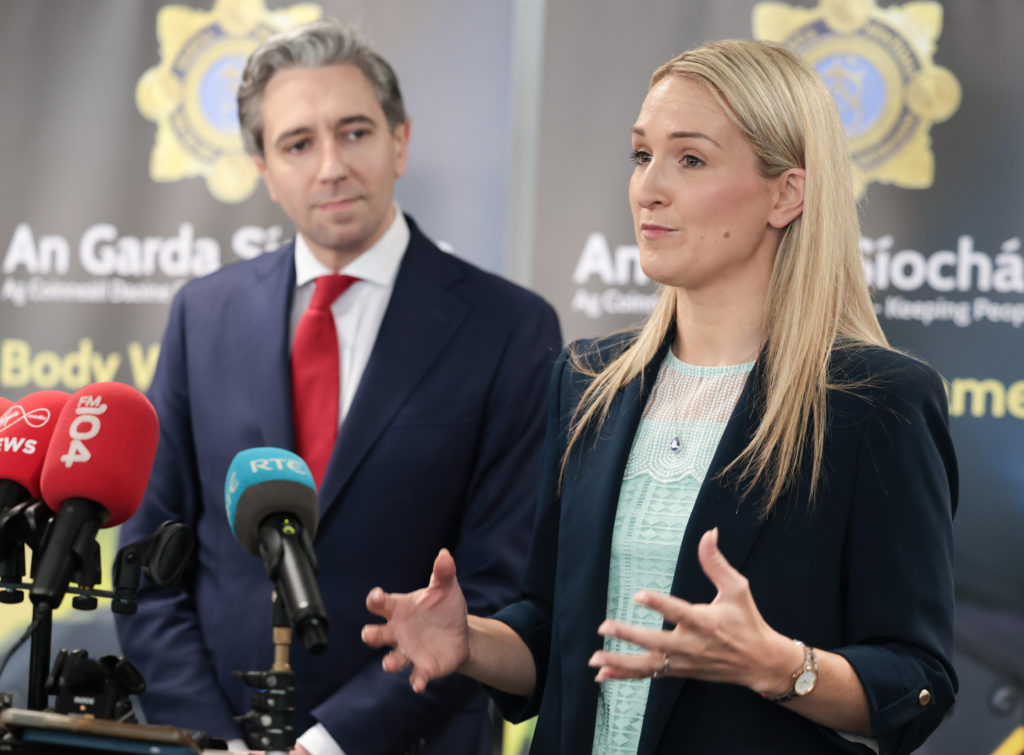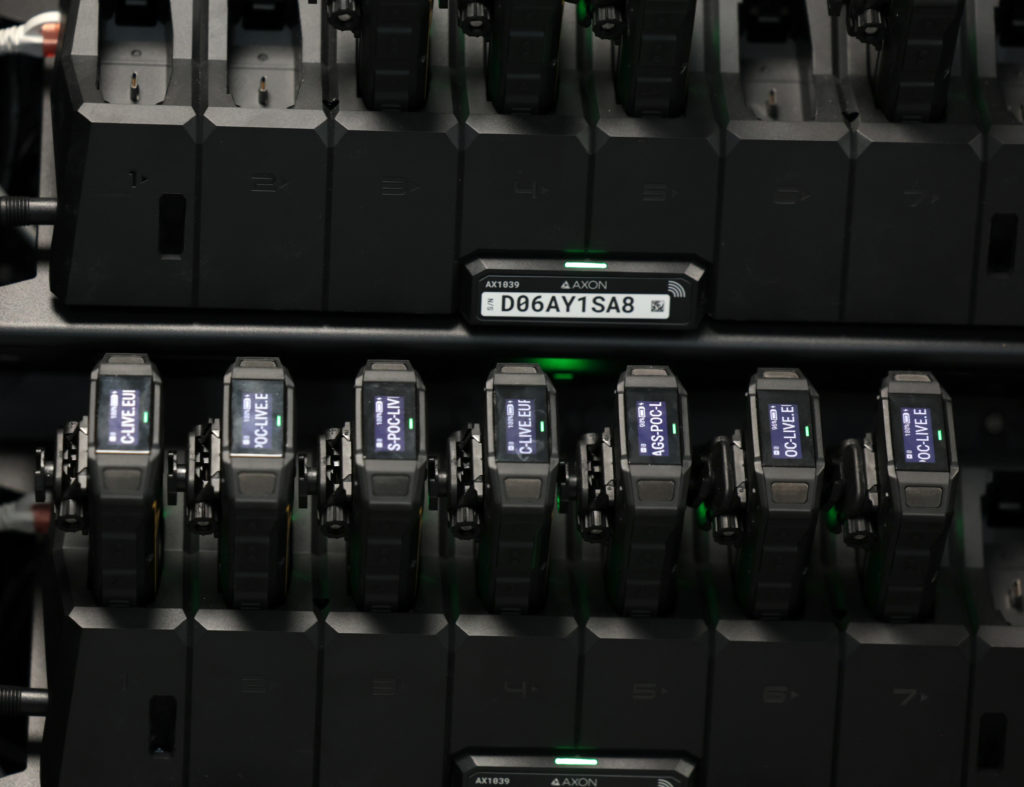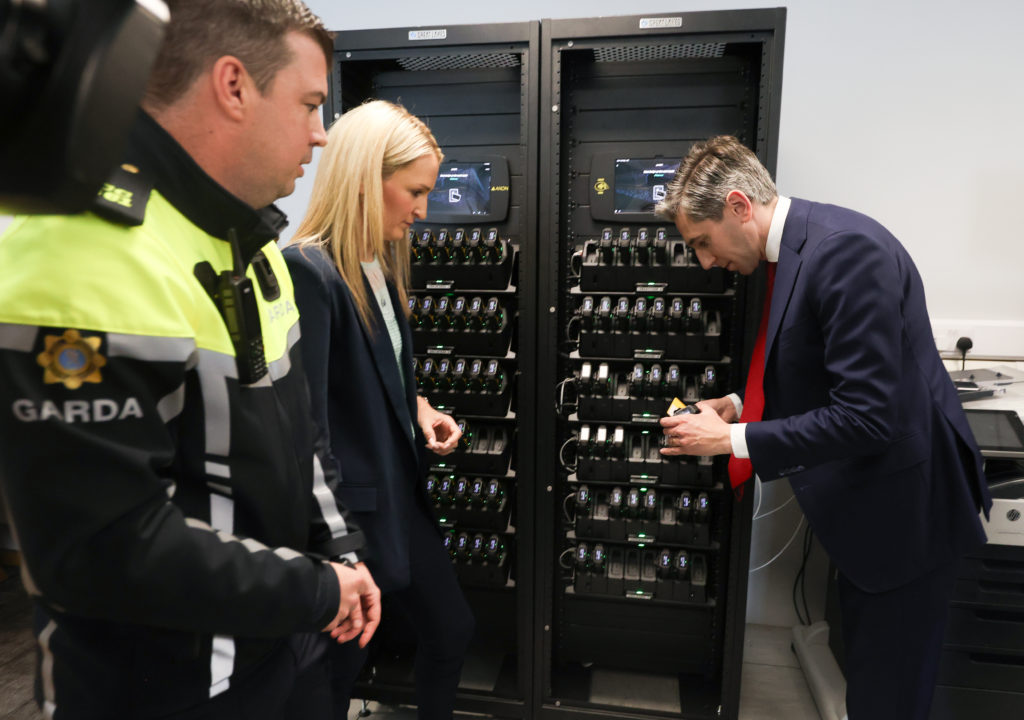GARDAÍ have started wearing body-worn cameras in a pilot scheme rolled out in Dublin this weekend.
Frontline officers have been equipped with the mobile recording devices for the very first time, as the Irish Government attempts to better protect their officers while improving their ability to collect evidence in the course of their duties.
The historic move is also designed to even the playing field for the force when faced with incidents where they find themselves being recorded.
“Ensuring frontline gardaí are equipped with body-worn cameras has been a priority for me and I am glad to say we are now in a position to launch the pilot phase of this initiative which will vastly improve how we police our streets,” Ireland’s Justice Minister Helen McEntee said as the pilot scheme launched in Dublin with the rollout of 350 cameras.
 Taoiseach Simon Harris and Minister for Justice, Helen McEntee and Garda Commissioner, Drew Harris attended the launch of the pilot phase of bodyworn cameras for frontline Gardaí being rolled out in Dublin
Taoiseach Simon Harris and Minister for Justice, Helen McEntee and Garda Commissioner, Drew Harris attended the launch of the pilot phase of bodyworn cameras for frontline Gardaí being rolled out in DublinThe rollout is set to continue later this year with further devices deployed at garda stations in Limerick and Waterford.
“The introduction of body-worn cameras is part of my plan to ensure that An Garda Síochána is a leading edge, modern police service fit for the digital age," Ms McEntee added.
Claiming the new technology will be "invaluable to the Gardaí who will use it”, the minister further confirmed it is her intention to have body-worn cameras on Gardaí in “every part of the country.”
“Policing organisations around the world have found that body-worn cameras can help improve front-line capability with the accurate recording of incidents, such as instances of domestic abuse,” she explained.
“We cannot keep sending Gardaí into situations where they are the only ones without the ability to record what is happening,” she added.
 Frontline Gardaí have begun using body-worn cameras
Frontline Gardaí have begun using body-worn camerasSuch sentiment was echoed by Taoiseach Simon Harris, who was also in Dublin for the launch event.
“Today marks an important step forward for policing in Ireland,” he said.
“Body-worn cameras are vital to protecting gardaí on the beat as they experience an increase of attacks which will not be tolerated.
“Too often gardaí find themselves in situations where they are being recorded in tense situations with footage often edited to suit a particular narrative,” he added.
“This technology will offer protection both to gardaí and to the public with accurate recording of incidents.
“Body-worn cameras will also assist gardaí with their investigations and will be an effective tool for evidence gathering where necessary.
“I look forward to hearing the feedback both from gardaí and the public ahead of further roll-out of body-worn cameras across the country.”
 Taoiseach Simon Harris, Minister McEntee and Garda Commissioner Drew Harris view the new body-worn cameras at the Dublin launch
Taoiseach Simon Harris, Minister McEntee and Garda Commissioner Drew Harris view the new body-worn cameras at the Dublin launchGarda Commissioner Drew Harris has described the move to equip his workforce with body-worn cameras as “an important milestone” for the force.
“Body-worn cameras, supported by the underlying legislation, technology and training, will act as an important evidentiary tool,” he said.
“International experience has also shown that body-worn cameras will increase safety for Gardaí and the public," he added.
“Now, through this proof of concept, we will be able to refine our systems and processes for body-worn cameras based on experience and feedback.”
Each body-worn camera can record footage to its own internal encrypted storage, which will be uploaded when the garda docks the camera in a garda station.
The body-worn camera footage will be uploaded at the end of each shift so it can be used as evidence at court or is deleted after an agreed time period if it's not required as evidence.

